Photos: Pork sandwiches and baked beans from the 4-H Swine Club

The 4-H Swine Club once again served up delicious helpings of pulled pork, baked beans, coleslaw and salt potatoes for their annual fundraiser at the fairgrounds.
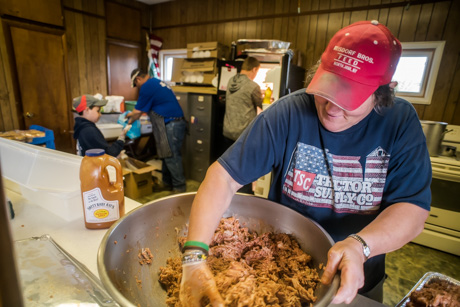
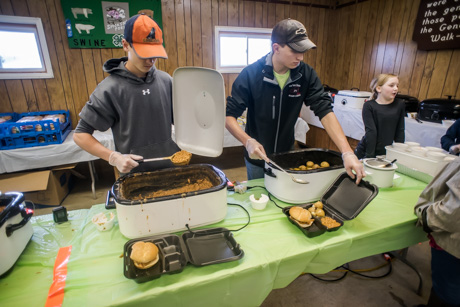

The 4-H Swine Club once again served up delicious helpings of pulled pork, baked beans, coleslaw and salt potatoes for their annual fundraiser at the fairgrounds.


Sen. Michael Ranzerhofer today issued a statement about the lawsuit filed Tuesday by the NY Civil Liberties Union seeking improved rights for farmworkers. The Senator says the suit will have a devastating impact on local jobs and farms.
After the lawsuit was filed against Gov. Andrew Cuomo and the state in the New York Supreme Court in Albany, the governor made it known that he backed workers' rights and the NYCLU's efforts and that he would not contest the litigation.
Among its aims is to allow farmworkers to unionize and get paid overtime. The NYCLU maintains that existing state law does not provide farmworkers with the protections that other worker groups are afforded. Cuomo noted "inconsistencies" and said workers in any sector should not be exploited.
The increase in the minimum wage approved last month in New York includes farmworkers and the wage will become $12.50 per hour by in end of 2020 in Upstate New York. Farms are expected to get a $30 million subsidy to accommodate the wage increase.
Ranzenhofer issued the following statement this afternoon:
“The New York Civil Liberties Union is trying to push increased regulations on farm workers through the courts. These burdensome regulations would force local farms to eliminate jobs and potentially go out of business. Whether it is New York City politicians or the NYCLU, they have little to no understanding of the economic realities of the agriculture industry. If the NYCLU wins this lawsuit, then it will have a devastating impact on our family farms and jobs in our rural communities.”
The Genesee County Ag Society will present a Livestock Fitting, Showmanship & Judging Clinic May 20-22 at the Genesee County Fairgrounds. It is located at 5056 E. Main Street Road, Batavia.
It is intended to be a learning opportunity for young people. All youths age 8 to 19 are particulary welcome and they do NOT have to be members of 4-H or Future Farmers of America (FFA).
Friday, May 20, is Livestock Game Night. Saturday, May 21, is a Livestock Clinic. Sunday, May 22, there will be industry speakers talking about nutrition, genetics and the ag business.
Topics covered during the weekend will include: Nutrition & Care, Basic Training, Showmanship Overview & Practice, Fitting & Hoof Trimming, Livestock Species Knowledge, and Judging & Oral Reasons.
Tickets are $30 per youth, which includes a T-shirt and chicken BBQ. Accompanying adults are $15 (but if they want a T-shirt and chicken BBQ, it's $30).
Camping is available for the weekend. Cost is $25 one night, or $40 for both Friday and Saturday nights.
Early registration is recommended.
Any questions, call Heather Weber 585-297-3032.
Cornell Cooperative Extension of Genesee County, 420 E. Main Street, Batavia NY 14020
Phone: (585) 343-3040 ext. 101 Fax: (585) 343-1275
Press release:
Did you know that chickens make amazing backyard pets? They help control the bug population, eat table scraps, and provide nutrient-rich, great-tasting eggs! Learn how chickens make ideal 4-H projects for youth in rural, suburban, and urban settings by attending Poultry Palooza!
This program, presented by Cornell Cooperative Extension of Genesee and Monroe Counties, will take place from 10 a.m. to 2 p.m. on Saturday, June 4, at the Kennedy Building on the Genesee County Fairgrounds, 5056 E. Main Street Road, Batavia.
This event is open to all Finger Lakes area youth ages 5–19. Youth do not need to be 4-H members to participate. Youth ages 5–8 must have an adult present.
Poultry Palooza will feature two levels of workshops: beginner and advanced. The beginner level workshop is for youth who are new to owning poultry or are thinking of starting a poultry project. The advanced level workshop is for youth who are familiar with poultry and wish to advance their knowledge.
Workshop topics include: proper bird handling, flock management, nutrition, diseases, showmanship and more!
The registration fee is $10 per youth and includes lunch (or youth may bring their own), and a copy of the "4-H Poultry Resource Handbook" courtesy of the New York State 4-H Rice Fund. (One resource guide per family will be provided.)
The registration deadline is May 23. For a complete event brochure and registration form, please visit http://genesee.cce.cornell.edu/events or contact the Monroe County 4-H Office at 585-753-2568 or monroe4h@cornell.edu.
Press release:
U.S. Department of Agriculture (USDA) will provide a new financing option to help farmers purchase portable storage and handling equipment.
Farm Service Agency (FSA) Administrator Val Dolcini and Agricultural Marketing Service (AMS) Administrator Elanor Starmer announced changes to the Farm Storage Facility Loan (FSFL) program today during a local and regional food roundtable in Columbus, Ohio. The loans, which now include a smaller microloan option with lower down payments, are designed to help producers, including new, small and mid-sized producers, grow their businesses and markets.
“As more communities reconnect with agriculture, consumer demand is increasing for food produced locally or regionally,” Dolcini said. “Portable handling and storage equipment is vital to helping farmers get their products to market more quickly and better maintain product quality, bringing them greater returns. That’s why we’ve added this type of equipment as a new category for our Farm Storage Facility Loan program.”
The program also offers a new “microloan” option, which allows applicants seeking less than $50,000 to qualify for a reduced down payment of five percent and no requirement to provide three years of production history. Farms and ranches of all sizes are eligible. The microloan option is expected to be of particular benefit to smaller farms and ranches, and specialty crop producers who may not have access to commercial storage or on-farm storage after harvest. These producers can invest in equipment like conveyers, scales or refrigeration units and trucks that can store commodities before delivering them to markets. Producers do not need to demonstrate the lack of commercial credit availability to apply.
“Growing high-value crops for local and regional markets is a common entry point for new farmers,” Starmer said. “Since they often rent land and have to transport perishable commodities, a loan that can cover mobile coolers or even refrigerated trucks fills an important gap. These producers in turn supply the growing number of food hubs, farmers markets or stores and restaurants interested in sourcing local food.”
Earlier this year, FSA significantly expanded the list of commodities eligible for Farm Storage Facility Loan. Eligible commodities now include aquaculture; floriculture; fruits (including nuts) and vegetables; corn, grain sorghum, rice, oilseeds, oats, wheat, triticale, spelt, buckwheat, lentils, chickpeas, dry peas sugar, peanuts, barley, rye, hay, honey, hops, maple sap, unprocessed meat and poultry, eggs, milk, cheese, butter, yogurt and renewable biomass. FSFL microloans can also be used to finance wash and pack equipment used post-harvest, before a commodity is placed in cold storage.
AMS helps thousands of agricultural food producers and businesses enhance their marketing efforts through a combination of research, technical services and grants. The agency works to improve marketing opportunities for U.S. growers and producers, including those involved in specialty crop production and in the local and regional food systems. Visit http://www.ams.usda.gov/ to learn more about AMS services.
Today’s announcement will further advance the efforts of USDA’s Know Your Farmer, Know Your Food initiative, which coordinates the Department's work to develop local and regional food systems. USDA is committed to helping farmers, ranchers, and businesses access the growing market for local and regional foods, which was valued at $12 billion in 2014 according to industry estimates. Under this Administration, USDA has invested more than $1 billion in more than 40,000 local and regional food businesses and infrastructure projects. More information on how USDA investments are connecting producers with consumers and expanding rural economic opportunities is available in Chapter IV of USDA Results on Medium.
To learn more about Farm Storage Facility Loans, visit www.fsa.usda.gov/pricesupport or contact a local FSA county office. To find your local FSA county office, visit http://offices.usda.gov/.

(Photos by Jim Burns.)
A Canadian proposal to reduce the amount of milk products imported from the United States, and to impose a tariff, could have perilous financial consequences for Western New York dairy farmers and cooperatives such as O-AT-KA in Batavia, which exports 20 percent of its goods to Canada annually.
At a press conference this morning in the plant's cafeteria off Cedar Street, Sen. Charles Schumer vowed to bring all his clout -- built over 18 years in the Senate -- to bear to stop the limitations being put forth by the nation's trade ministry in conjuction with its agriculture department under new government leadership.
Last year, U.S. dairies produced 200 billion pounds of milk; 85 percent of that was consumed by Americans and 15 percent was exported, said O-AT-KA CEO Bill Schreiber.
"Canada's trying to put in a new rule that would be devastating to O-AT-KA and Western New York," Schumer told the media, union employees, dairy farmers and local officials in attendance. "That ultra-filtered milk came in duty-free. Now they're trying to change that. ... and the Province of Ontario wants to keep out (U.S.) dairy sales."
For O-AT-KA, the restrictions would amount to a loss of 180 million pounds of annual milk production -- which is 20 percent of $95 million in yearly sales, or $19 million, according to Schreiber.
WIth more than 350 employees, the facility is one of the largest employers in the Genesee County. Upstate Niagara Cooperative, made up of nearly 400 dairies, is the majority owner of O-AT-KA.
WNY dairies are poised for growth, despite recent declines in milk pricing -- from $25 per hundredweight (the name of the commodity pricing unit) to $15 currently.
In 2012, O-AT-KA invested $16 million to build a new two-story addition to allow "ultra-filtration" capabilities in order to expand its product line and boost sales to other producers in the United States and abroad, especially Canada. Products include non-fat dry milk powder, buttermilk powder, whey powder, canned evaporated milk, butter, fluid condensed milk, iced coffee, nutritional beverages and other drinks. Ultra-filtered milk is used in cheese making.
Schumer said the recently proposed Canadian trade barriers could hinder plans for growth.
"We have good neighbors in Canada, but every so often something happens," the senator said. "This proposal would bring our mutual agreement to a screeching halt. It would put O-AT-KA and New York's dairy farmers in grave jeopardy. It would imperil the whole Upstate economy."
When asked "Is there really anything you can do?" if another nation, like Canada, implements a trade rule you don't like, Schumer replied: "Yes, a big leverage is tariffs. It's not a one-way street. It's not just exporting to Canada; we import from Canada, too."
It boils down to the fact that "we just have a stronger dairy industry and they're trying to build their's."
The rules, if implemented, would take effect in about six months.
"I'm here to go to bat for you," Schumer said. "I'm going to send a shot across the bough."
Schumer is calling on the U.S. Trade Representives and the USDA to work to protect U.S. dairy exports by ensuring that Canada doesn’t impose restrictive trade rules and honors its commitment to open borders to Upstate New York farmers.
The proposal to limit U.S. dairy imports comes on the heels of the "Trans-Pacific Partnership," referred to commonly as TPP, being signed in New Zealand last month after seven years of negotiations. Besides New Zealand, it is made up of Canada and 10 other Pacific Rim countries, including the United States, Australia, Vietnam, Brunei, Singapore, Malaysia, Japan, Chile, Mexico and Peru. Ratification is anticipated over the next two years.
According to the Toronto Sun (Feb. 4. 2016), the pact could impact many industries in Canada, including agriculture, and some opponents fear it could hurt the economy and result in layoffs in some sectors. As part of the deal, Canadian dairy farms are slated to get $4.3 billion in subsidies from their government over a span of 15 years to offset losses from an increase in dairy imports from TPP trading partners.
Schumer made it clear that he opposes big trade agreements like TPP, just as he opposed and voted against NAFTA during the Clinton Administration.
Here's a copy of Schumer’s letter to both the USTR and USDA:
Dear Ambassador Froman and Secretary Vilsack:
I write to you with strong concerns about reports that Canada is weighing policy and regulatory shifts that would undermine one of New York’s most important export markets. Just a few years ago, two dairy companies made investments worth tens of millions of dollars in Upstate New York to produce ultra-filtered milk specifically for export to the Canadian cheese market. These sales are possible as a result of the duty-free access for this specific product that Canada agreed to under the North American Free Trade Agreement.
Recent reports indicate that Canada is considering administrative actions to limit Canadian companies’ capacity to use this product in further processing and that Ontario is advancing a new, targeted pricing policy designed to crowd out New York’s dairy sales. Further restraints on dairy trade are unacceptable, particularly coming on the heels of Canada’s recent pledge to expand access to its tightly restricted dairy market under TPP.
New York has made sizable investments in exporting into Canada under specific rules laid out by the Canadian government. Those sales now help support dairy farmers and rural communities across the state. New Canadian barriers to market access would have an outsized impact on New York’s dairy sector. As the country’s third largest milk producing state, a significant impact on New York’s ability to tap into key foreign markets also will impact farmers in surrounding states in the Northeast and Mid-Atlantic region. Moreover, this latest example of dairy market-access restrictions appears to represent a continuation of persistent Canadian regulatory and policy shifts aimed directly at impeding dairy trade.
We must hold Canada to its commitments and ensure that our exporters do not encounter barriers to the products they are already shipping to Canada. I urge you to strongly reject this and similar efforts to impair the value of concessions the U.S. previously secured under NAFTA. Thank you for your attention to this important priority with one of this country’s largest trading partners.
Sincerely,
Charles E. Schumer
United States Senator
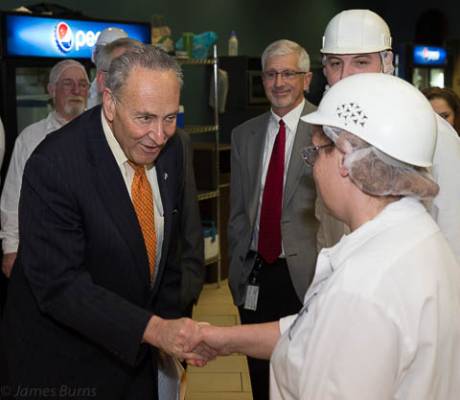
Press release:
Genesee County Farm Bureau, in collaboration with Monroe Tractor, will be offering a NYS DOT Truck Rules and Regulations Training Program on Thursday, March 31, for area agriculture producers and their employees.
This training program is designed for producers and farm employees to become familiar with and review laws and regulations regarding proper truck operation throughout the year. It will be held from 9:30 to 11:30 a.m. at the Elba Fire Hall, 7143 Oak Orchard Road, Elba.
There will be presentations by New York State Police about the legalities of driving farm equipment on our roads, as well as identify major problems with truck rules and regulations. Weather permitting, the training will conclude with a truck walk-around to identify problem areas and checkpoints.
Following the morning session, a DEC pesticide recertification program will also be offered at the same location from 1 to 4 p.m. This afternoon program will include discussions on weeds, diseases and insects in corn and soybeans, prepping your sprayer for the upcoming season, and an update on pesticide regulations. Bring your pesticide card to earn 2.5 recertification points.
There is no need to register for these trainings. For more information, contact James Kingston, Batavia Monroe Tractor Branch Manager at 585-746-1670.
Press release:
Small business owners and family farmers joined together today at a press conference in Batavia to ask state lawmakers to oppose the $15 minimum wage. The April 1st budget deadline is just days away, and the coalition remains united in its efforts to defeat what will be a tough blow to local employers.
The consequences of a 67-percent wage hike are far reaching. The small businesses shared their personal stories of what this will mean to each of them, including the decisions that will have to be made to compensate for the major increase in labor costs. A reduction in the number of employees and an increase in automation are on the table should this proposal pass in Albany.
The impacts will be felt statewide. A recent report conducted by the former director of the Congressional Budget Office, found that at least 200,000 jobs will be lost across the state. A separate independent analysis by Farm Credit East estimates a $15 minimum wage in New York State would cost farmers between $387 and $622 million in 2021 at the peak of the wage rollout and nearly 2,000 farms would no longer be profitable. Businesses that can’t make money, don’t stay in business.
Because of the statewide ramifications, today’s event coincided with more than a dozen others happening in communities across New York. It is a final push to make the compelling point to lawmakers that there are serious consequences, from job loss to higher consumer prices, should New York pass a $15 minimum wage. The small business owners asked their local lawmakers to vote no on $15.
“Businesses will be forced to raise prices to compensate. As a farmer, I cannot do this. I am a price taker not a price maker. This will make me uncompetitive with surrounding states, like Michigan and Pennsylvania, whose labor costs will be half what they are in New York. This will put some farms out of business or force them to move to a different state which will hurt our economy,” said Pat McCormick, NYFB District 2 Director and dairy farmer from Java Center.

Submitted photos and press release:
Each year, in celebration of National Agriculture Week, volunteers throughout the state read a book with an agricultural theme to second-graders. Students benefit from hands-on lessons and follow up activities.
Today, second-graders at Alexander Elementary School participated. Barb Sturm and Molly Grimes were presenters from Cornell Cooperative Extension in Genesee County.
The selected book for 2016 is "The Apple Orchard Riddle" by Margaret McNamara, illustrated by G. Brian Karas. This story shares the journey of Mr. Tiffin’s class on a field trip to an apple orchard. The students learn about every aspect of the farm from how apples are harvested, the process of making cider, and the many different varieties of apples.
This year’s focus on apple production is exciting because of the importance of the apple industry in New York State, as we are ranked second nationally in production.


Submitted photo of the 2016 Genesee County 4-H Horse Bowl Club. From left, back row: Alexandria Tarbell, Gabriella Rindell, Eva Rhoads, Elizabeth Rindell, and Cindy Bovier, Horse Bowl Leader. Front row: Colton Tarbell, Annalee Winnicki, Karly Smith and Katie Ewert.
Press release:
Congratulations to the Genesee County 4-H youth who competed in the 2016 Region II 4-H Horse Extravaganza at Mid Lakes High School in Phelps on Saturday, March 5.
4-H youth from across the region came together to compete in both 4-H Horse Quiz Bowl, in which youth compete as a team in answering horse knowledge based questions and 4-H Horse Hippology, a contest in which youth participate in a written exam, identification of items shown on slides, placing and/or ID of feedstuffs or feed tags, judging, ID stations, and team problems.
The results from participating Genesee County 4-H youth participants are as follows:
4-H Horse Bowl Event Results
Senior Category: Team placement -- 6th of 6 teams; member: Emily Boldt.
Individual Ranking within the senior participants: Emily Boldt -- 15th
Junior Category: Team placement -- 1st of 7 teams; members: Elizabeth Rindell, Gabriella Rindell, Alexandria Tarbell and Eva Rhoads.
Individual Rankings within the junior participants:
Gabriella Rindell – 1st
Alexandria Tarbell – 4th
Elizabeth Rindell – 17th
Eva Rhoads – 19th
Novice Category: Team placement- 5th of 6 teams; members: Katie Ewert, Karly Smith, Colton Tarbell and Annalee Winnicki.
Individual Rankings within the participants:
Karly Smith – 7th
Colton Tarbell – 9th
Katie Ewert – 10th
4-H Hippology Event
Senior Category: Team placement -- 2nd of 6 teams; member: Emily Boldt.
Individual Ranking within the senior participants: Emily Boldt -- 7th
Junior Category: Team placement -- 1st of 9 teams; members: Elizabeth Rindell, Gabriella Rindell, Alexandria Tarbell and Eva Rhoads.
Individual Rankings within the junior participants:
Gabriella Rindell – 1st
Alexandria Tarbell – 3rd
Elizabeth Rindell – 4th
Eva Rhoads – 20th
Novice Category: Team placement -- 3rd of 6 teams; members: Katie Ewert, Karly Smith, Colton Tarbell and Annalee Winnicki.
Individual Rankings within the novice participants:
Karly Smith – 2nd
Colton Tarbell – 9th
Katie Ewert – 11th
Annalee Winnicki – 18th
For more information regarding local opportunities in 4-H Youth Development call Cornell Cooperative Extension of Genesee County at 585-343-3040, ext. 101, or e-mail genesee4h@cornell.edu

Representatives of Z&M Ag and Turf presented a donation of tools to the conservation program at BOCES yesterday as part of a two-day seminar by Z&M and John Deere on some of the latest farming technology.
The first day was focused on dealers from throughout New York and yesterday the farms and shop techs came in to learn about technology advances from John Deere and the new precision GPS planting system.
John Duyssen is one of the conservation instructors -- concentrating on diesel and hydraulics repair and maintenance -- and he said the job of being a farmer is getting a lot more sophisticated as technology becomes more embedded in the process of planting and harvesting. The conservation program provides that instruction along with instruction on soil and water conversation.
Top photo: Carson Decarlo, left, Tom Klaeper, Tarra Shuknecht, John Tyx, Keith Conwa, Branden Cerefin, John Duyssen, and Ed Swain.
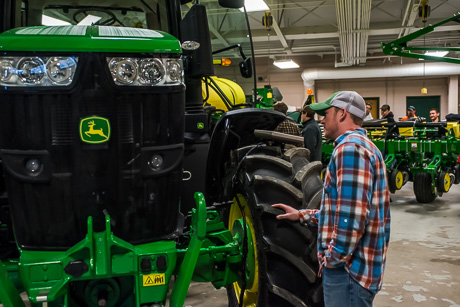
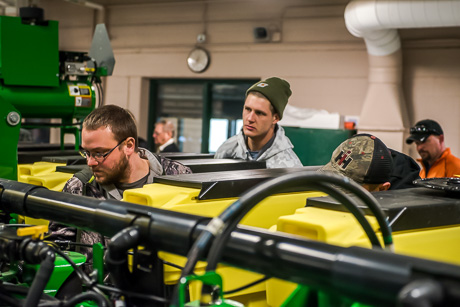

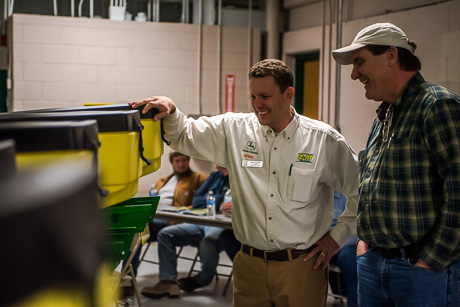
Press release:
The 2016 NYS Dry Bean Growers Meeting will be held from 9 a.m. to 3 p.m. on Wednesday, March 16, at the Le Roy Country Club, 1 mile east of Le Roy on Route 5/East Main Road. Join us for production updates on Western bean cutworm, white mold, varieties and bean breeding, and soil health.
There will be a marketing update from Tim McGreevy, CEO, American Pulse Assoc., Moscow, ID, on: 2016 - International Year of Pulses: Why they are the Future of Food (dry beans/peas, lentils, chickpeas are pulses).
In addition, final results of Robin Bellinder’s reduced tillage dry bean weed control trials, and trials of potential new dry bean herbicides, will be reported. Food safety practices and documentation required by buyers will be covered. There will also be a report from the Dec. 1st Organic Dry Bean Discussion Group. The NYS Dry Bean Industry Committee will meet at 3:00 pm, and decisions on funding 2016 dry bean research will be made.
Lunch will include tasty, NYS dry bean dishes from the New York Coalition for Healthy School Food. 1.75 DEC credits (1a, 21, 23, 10) and CCA credits will be available. Preregister by March 10 to save $5!
Pre-registration: $20 for Cornell Vegetable Program enrollees receiving Veg Edge; $30 for all others. After March 10 cost is $5 more. Send a check made out to Cornell Vegetable Program – Dry Beans, to Cornell Cooperative Extension - CVP, 480 N. Main St., Canandaigua. NY 14424, Attn: Angela Parr.
Go to Events at: http://cvp.cce.cornell.edu/ for the agenda and a preregistration form. Sponsor opportunities are available from: Angela Parr at aep63@cornell.edu or 585-394-3977, ext. 426. Questions or special needs: Carol MacNeil at crm6@cornell.edu or 585-313-8796. In case of bad weather call 585-313-8796.
The Laboratory Practices Committee of the NY State Association for Food Protection (NYSAFP), NYS Agriculture & Markets and Cornell University will again offer five Regional Laboratory Seminars, March 22 through March 30.
In Genesee County, one will be held in Batavia on Thursday, March 31, at the Genesee Co. Career Center, 587 E. Main St., Suite 100.
These programs are designed for those actively working in dairy product testing and quality assurance programs, but may be of interest to others (e.g., Certified Milk Inspectors, plant receivers, etc.).
Topics will include an overview and update of the proficiency/split sample program; a discussion on pathogen environmental monitoring (PEM) programs; detailed information on new/future requirements for drug residue testing under appendix N; and an FDA/NCIMS/NY state update. Complete course program and directions to each course site available here.
Press release:
Currently, 4-H programming features the National Safe Tractor & Machinery Operation Program.
This course will qualify enrolled 4-H youth ages 14 and 15 years of age to be certified to operate farm equipment for hire. The course is scheduled to run from January through March.
The training program encompasses 32 hours of intensive instruction. Upon the completion of the training, each student will be required to take a 50-question knowledge test with a minimum passing score of 70 percent. Students who successfully pass the knowledge test will be permitted to take the Skills and Driving tests. After passing both the written test and driving tests, the students will receive their formal certification from U.S. Department of Labor.
Parents say the program allows youth to operate equipment legally, be employable, and increases self-confidence, emergency preparedness skills, and knowledge.
Training youth in safer tractor operation is a high priority in Genesee County. Our young people living and working on farms operate a variety of agricultural equipment, including tractors.
Thank you to the tireless volunteers that lead this training, and to the youth that participate. For more information, contact us at 585-343-3040 or visit http://genesee.cce.cornell.edu/
Cornell Cooperative Extension of Genesee County is the outreach arm for Cornell University in Genesee County. We provide research based knowledge addressing unmet needs for the residents of Genesee County. We are also the home to 4-H, which is the largest out-of-school youth organization in the United States with more than 6 million youth members.
4-H Clubs, camps, after-school programs, and trips help youth reach their fullest potential. Members have opportunities to connect to Cornell University, learn through hands-on activities, lead, be inspired, inspire others, and so much more. 4-H helps kids to do better in school, learn to help others, and feel more capable and responsible.
Press release:
Cornell Cooperative Extension Genesee County will present a Cheese Tasting and Evaluation workshop at 6:30 p.m. on Wednesday, March 9. The workshop will take place at the Extension Building, located at 420 E. Main St., Batavia.
The cost to attend the class is $15 per person and class size is limited! Please register by March 2.
If you love cheese, then you won’t want to miss this class! Learn all about the cheese-making process while sampling mozzarella, provolone, cheddar, goat and feta cheeses, which are all made in New York State!
The class will be presented by Carl Moody, dairy processing specialist with Harvest New York. Carl is a graduate of the University of Minnesota and holds a bachelor’s degree in Food Science. Following graduation, he worked at the Friendship Dairy in Friendship and most recently held a position as a quality assurance manager for 13 years with Lactalis American Group, Inc. (Sorrento Cheese) in Buffalo.
For more information about Harvest New York, visit http://harvestny.cce.cornell.edu/.
To register and for payment information, please contact Samantha at 585-343-3040, ext. 123 or sls428@cornell.edu.
For more information about CCE Genesee County, visit our Web site at http://genesee.cce.cornell.edu/.
Press release:
The New York Organic Dairy Program (NYODP) has partnered with the New York Farm Viability Institute to make grant funding available for organic dairy producers to participate in the Cornell Organic Dairy Farm Business Summary (DFBS) program and select a project for immediate attention through a modified Dairy Profit Team approach.
Farms currently participating in the Dairy Farm Business Summary and those that have not completed a DFBS before are both eligible for funding. Priority for grants will be given to certified organic dairies, however, farms in transition to become organic are encouraged to apply.
Farmers may first apply for funds to:
Funding is also available for farmers to work with a consultant on a project that will help the business better meet its goals. Applicants for a project grant must first complete a 2016 DFBS.
Farmers requesting project funds will be required to work with NYODP to document their desired goal and projects must be achievable within 18 months of the formation of the consultant "team." Examples of projects include, but are not limited to, developing a business plan, enhancing transitioning practices, and constructing facilities. NYODP will provide up to $1,500 for the consultant and team to complete its project work.
The Cornell Organic Dairy Farm Business Summary is a confidential program that collects operating and financial information from an individual farm to produce a report that the farm operator can use to identify areas where the farm is doing well and areas that need improvement. The Summary also helps analyze if the farm is meeting the financial and long-term goals of the farm business. If enough similar farms participate, the Cornell Organic Dairy Farm Business Summary will create benchmarks against which the owners of farms of similar size can measure their performance.
NYODP Manager Fay Benson will assist farmers in identifying a qualified farm business consultant for each of the two levels of funding. Consultants who have already agreed to work with this modified Organic Dairy Profit Team approach are:
Guidelines and application form for the NYODP consultant and project grants are posted online at http://blogs.cornell.edu/organicdairyinitiative/. Grants will be awarded on a first-come, first-serve basis until funding is spent. For more information, contact Fay Benson at 607-391-2669 or afb3@cornell.edu.
This grants opportunity is funded by the New York Farm Viability Institute through its Dairy Profit Team program.
The New York Organic Dairy Program, a program of the Cornell University College of Agriculture and Life Sciences and Cornell Cooperative Extension, provides information to all sectors of the organic dairy industry, including farmers, processors, certifiers, retailers and consumers. The number of certified organic dairy farms in New York has steadily grown to meet the yearly increase in demand for organic milk.
Press release:
Assemblyman Steve Hawley (R,C,I-Batavia) today announced that the state has made available $11 million in grants through the Agricultural Nonpoint Source Abatement and Control Program to assist farmers with projects to protect soil and water.
“Much of New York’s economy is driven by agriculture, especially in Western New York,” Hawley said. “We must protect our resources and keep this essential industry growing. To do so, New York State has made $11 million available to farmers via a grant program through the Agricultural Nonpoint Source Abatement and Control Program.”
These grants will be awarded to county Soil and Water districts to implement best practices such as structural soil conservation practices and agricultural waste storage. The program is funded directly through the state Environmental Protection Fund.
Press release:
“Annie’s Project” has been successful nationally and in New York with empowering farm women to become stronger business partners through clearer understanding of how to manage risk. “Managing for Today and Tomorrow” (MTT) will provide audiences the opportunity to become involved in the journey of transitioning their farm legacy to a new generation.
MTT will be offered in four Thursday sessions from 10 a.m. to 2:30 p.m. at the Genesee and Ontario County Cornell Cooperative Extension offices beginning Feb. 18th by Cornell Cooperative Extension’s North West New York Dairy, Livestock and Field Crops Team.
MTT will be guided by the same core values as Annie’s Project: Guided Intelligence builds on women’s natural tendency to share, teach and learn with other women; Connection creates opportunities of connection to other farm women and local practitioners; Discovery helps women make sense of topics through hands-on activities and discussion; Safe Harbor provides a comfortable and secure environment where all questions are welcome.
Participants in MTT will focus on transition planning for their farm businesses. Whether you are in the prime of your farming career, just getting started or thinking about later phases of life, transition planning is likely to be important to you. Because family and business are often closely tied together in agriculture, transition planning must address issues of business sustainability and family relationships. MTT addresses succession, business, estate and retirement planning in the context of a farm business. For some, transition planning may involve successors who are not part of the family.
Topics covered will include goal setting, clarifying values personal vision, resolving conflict, financial documents and vocabulary, asset transfer methods, and retirement options among many others.
Farm women must register to participate in Managing for Today and Tomorrow. The cost is $100 per person and includes 15 hours of instruction, an extensive collection of instructional materials and a light lunch at each session.
To register for either location, contact Zach Amey at zta3@cornell.edu or 585-786-2251, ext. 123. For questions about what the classes will cover reach out to Joan Petzen, jsp10@cornell.edu, 585-786-2251, ext. 122 or Marie Anselm, ms882@cornell.edu or 585-394-3977, ext. 402. Register today and save the dates, Feb. 18 and 25, and March 3 and 10. Reserve March 17 for a snow date.
This program is sponsored by Cornell Cooperative Extension, and supported in part by the Northeast Extension Risk Management Education Center, the USDA National Institute of Food and Agriculture (NIFA) award number 2012-49200-20031, CoBANK, Farm Credit East, New York FarmNet, NYS Agricultural Mediation Center, NYS Workforce Development Institute, and New York Agri-Women, Inc.
Press release:
Cornell Cooperative Extension of Genesee County is pleased to announce that MeatSuite.com, an online directory of livestock farms selling in bulk, has arrived in our county!
MeatSuite.com connects consumers interested in buying local meat with local farms selling meat in bulk, thus promoting farm viability and food affordability.
Cornell Cooperative Extension's research has found that selling meat directly to consumers by the whole, half, or quarter animal is more profitable for the farmer and more affordable for consumers. When purchased in bulk, local meat prices are competitive with meat sold in grocery stores.
Farms interested in joining can visit www.MeatSuite.com or contact their local Cornell Cooperative Extension office for more information.
Creating a MeatSuite farm profile is one way to reach new potential customers and expand your farm’s online presence. MeatSuite offers you an opportunity to explain to consumers why your farm is unique. While we cannot guarantee that MeatSuite will generate sales for you, we encourage you to take a few minutes to join. It’s easy, fast, and free. The more farms that join, the more consumers will see MeatSuite as a great shopping resource.
On Thursday, Dec. 17, at 7 p.m. there will be a Meat Suite Producer Informational Meeting held at the CCE Ontario County office -- contact: Marie Anselm, 585-394-3977, ext. 402. Nancy Glazier, NWNY Team Small Farms/Livestock Specialist, will provide an overview of MeatSuite, how to develop your farm’s pro-file, and meat cutout.
This meeting will be also broadcast live at two locations; Wyoming County CCE -- contact Sarah Carlson 585-786-2251, ext. 112; and Niagara County CCE -- contact Amanda Henning 716-433-8839, ext. 231 for more information.
MeatSuite.com went live in 2012 and originally served nine counties. The current expansion, made possible through a grant from the New York Farm Viability Institute, reaches 16 new counties, including Genesee County.
For more information contact Jan Beglinger at 585-343-3040 ext. 132 or at jmb374@cornell.edu.
Press release:
To help support our local agriculture industry and to provide producers with expert information, Genesee County Cornell Cooperative Extension offers its annual “Agriculture Enrollment.”
Farms enrolled in 2016 will receive direct access to the NWNY Dairy, Livestock and Field Crops Team and Cornell Vegetable Program specialists who work hard in our region to address the concerns of our producers.
The Cornell Vegetable Program (CVP) specialists work together with Cornell University faculty and extension educators statewide to address the issues that impact the industry. The CVP provides educational programs and information to growers, processors and agri-business professionals, arming them with the knowledge to profitably produce and market safe and healthful vegetable crops. This in turn contributes to the viability of farms and the economic well-being of New York State. Specifically, the CVP focuses on food safety, variety evaluation, market development, pest management and cultural practices.
The NWNY Dairy, Livestock and Field Crops Team specialists work together with Cornell University faculty and extension educators statewide to provide service to farms large and small, whether dairy, livestock, hay, corn, wheat or soybean focused. The team is part of the Cornell College of Agriculture & Life Sciences Pro-Dairy program outreach. Specialists cover the areas of dairy production, field crop production, farm business management, small farm management and livestock production. For dairy farms, a bilingual dairy specialist provides producers with employee training and human resource facilitation in Spanish.
Both teams serve Genesee County by providing educational programs with classroom and hands-on training, farmer discussion groups, newsletters with timely production information, telephone/email consultations, direct mailings of special events, as well as farm visits and research opportunities. Enrollees are eligible for reduced registration fees for educational meetings.
Cost of enrollment is $65 per team. Cornell Pest Management Guidelines (hardcopy and online) are available for an additional cost. To receive an enrollment form please contact Jan Berlinger at 585-343-3040, ext. 132, or at jmb374@cornell.edu.
Copyright © 2008-2022 The Batavian. All Rights Reserved. Privacy Policy | Terms of Service